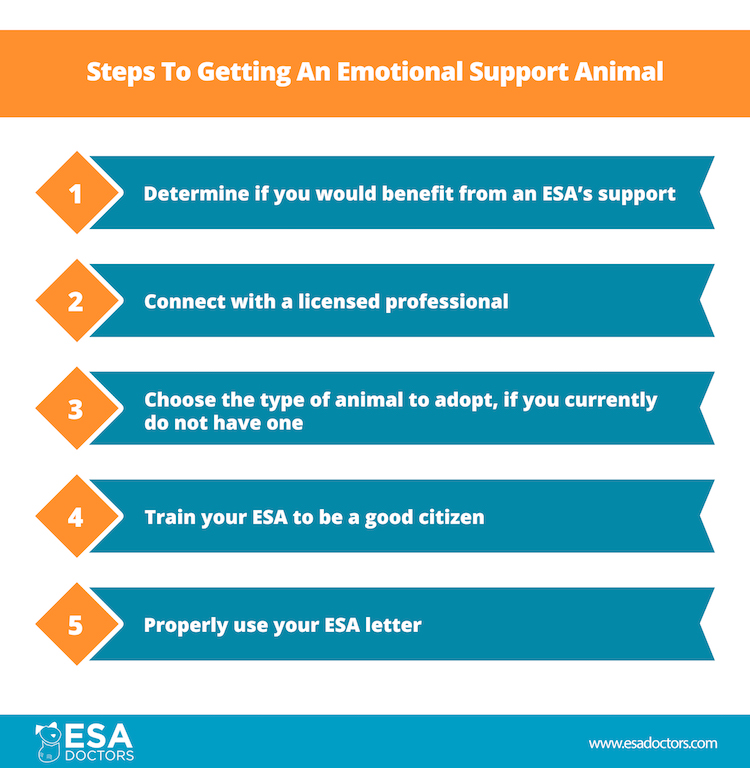Most people don’t decide to ask for an emotional support animal (ESA) without giving it a lot of thought. Typically, a person with a mental or emotional disability finds themselves needing the unconditional companionship and affection of an animal. They then decide to inquire with their healthcare professional about an ESA. If the LMHP agrees that an animal can provide benefits to the individual, they will issue an ESA letter.
An ESA letter can be written by a licensed healthcare professional such as a therapist, doctor, psychologist, social worker, registered nurse or psychiatrist. Many healthcare providers however, including at Kaiser Permanente, are reluctant or unwilling to issue emotional support animal letters for various reasons. We’ll discuss why that is and what alternatives you have if you are interested in obtaining an effective ESA letter from a licensed healthcare professional.
What is an ESA Letter?
An ESA letter provides proof that an animal is not a pet and is instead an ESA. Written by a licensed mental healthcare professional, an ESA letter indicates that an animal is a part of a person’s needs for an emotional or mental health disorder. A legitimate ESA letter allows a person to reside in a “no pets allowed” housing without paying pet fees. Tenants with an ESA letter are also free from other restrictions applicable to pets, such as those relating to size, weight and breed of animal.
ESAs are recognized as a effective way to help people suffering from mental illnesses. The benefits of animal companionship have been studied and are known by healthcare professionals. Despite the tremendous health benefits of ESAs, some healthcare professionals will not write ESA letters for reasons we’ll discuss in the next section.

Why Would a Healthcare Professional Refuse to Write an ESA Letter?
There are many reasons a healthcare professional would refuse to write an ESA letter. Healthcare professionals usually have the best intentions and want to assist their clients in the best way they can. However, some may lack awareness of the research regarding the healing properties of the human-animal bond, especially for clients who suffer from depression or anxiety. Some professionals may also be unaware of the distinctions between a service animal, emotional support animal, and therapy animal.
For other healthcare professionals who refuse to write healthcare letters, however, the reasons are much more complicated. They may be confused about the standards regarding what qualifies a client to have an ESA. The healthcare professional may also be unaware of the federal and state housing laws that protect emotional support animals and what their requirements are. Even when patients come in with a legitimate need for an ESA, they are not inclined to write a letter simply because they are underinformed about what the process entails.
Some therapists may also be leery of writing an ESA letter because they are unsure how an ESA letter will be used. They may be confused about what their responsibilities are with respect to the ESA itself. Perhaps for all the above reasons, some patients have reported that they have had trouble obtaining ESA letters from providers at the largest Health Maintenance Organization (HMO) in the United States, Kaiser Permanente. This issue is not just limited to providers at Kaiser however – many other patients with other therapists and doctors have reported the same thing.
If you’re interested in an ESA, it’s important to find a therapist or doctor that is familiar with ESAs and the legal framework that protects ESA owners. A therapist comfortable with ESA recommendations will understand how to write an ESA letter and what their specific obligations are. Even though a doctor or therapist thinks an ESA is a great idea, they may not want to write an ESA letters simply because they are not properly informed, which is a legitimate concern.

ESAs as Effective Aid for Emotional or Mental Health Disorders
Does a refusal to write an ESA letter mean an emotional support animal is not effective? No, the refusal of some professionals to write ESA letters does not indicate that ESAs aren’t a meaningful or effective way to deal with mental health issues. Even Kaiser Permanente acknowledges the scientific evidence that animals have a profound effect on human beings. The organization recognizes the production of beneficial hormones when animals engage with their owners. The resistance towards writing ESA letters likely stems more from the reasons previously discussed rather than the effectiveness of ESAs.
For example, the National Institutes of Health recognizes the positive differences animals make in their owners’ lives. NIH studies find that interacting with animals can decrease levels of a stress hormone called cortisol and reduce blood pressure. Animals can also boost mood, reduce social isolation, and increase feelings of confidence.
Other Ways to Get an ESA Letter
If your therapist, doctor or social worker is not willing to write an ESA letter for you, don’t be discouraged. Their denial may simply be due to their unfamiliarity with ESA rules and fear of the unknown. There are licensed professionals who specialize in ESAs and will consider your ESA request with compassion and understanding. ESA letters can be conveniently obtained from licensed healthcare professionals that work online. The expense may not be covered by your HMO, but ESA Doctors can connect you to a licensed healthcare professional that understands ESAs for an inexpensive flat fee.







Leave a Comment